As the legend goes, Didar Singh Bains arrived in his new home of Yuba City in 1958 at age 18 with only $8 in his pocket, which was enough for him. A young immigrant from India with humble origins, he says he believed that in the U.S. “money could grow on trees.” In the course of his lifetime, that youthful optimism has proven true — at least figuratively.
Tired eyes? You can listen to the audio version of this story here:
Back then though, Bains was a young Sikh farmer who thought farming was next to godliness. He was raised in a small farming village in Punjab, a state in northern India bordering Pakistan. Sikhism originated in the region and remains a predominant religion there today. In 1948, when Bains was a boy, his father left for the U.S., following in the footsteps of his great-uncle who had eventually settled in the Yuba City area in the 1920s and told of available work and chances to improve their livelihoods. After his father left, Bains started farming in his village to provide for his mother and younger brother until he grew old enough to make his way to California.
Yuba City suited the family. “They chose this region because they felt there were adequate amounts of water, fertile soils and the climate with four actual seasons — and the geography, it reminded them of being back home,” says Bains’ son, Karm.
Just like his great-uncle and father before him, Bains started as a farm laborer, driving tractors, irrigating and pruning orchards, earning below minimum wage at $0.75 an hour. Acclaimed for doing the work of four men, he soon became a foreman. But his dreams of one day owning his own farmland and harvesting his own fruit would have to wait until he’d saved up some money. In 1962, Bains’ mother, Amar Kaur, joined her son and husband. Accompanied only by Bains’ younger brother, who was 13 at the time, she was one of the first Punjabi women to arrive in Yuba City.
Since the first Punjabis emigrated from India to California at the turn of the 20th century, this population has carved out a prominent role in the economy, culture and identity of Yuba City, despite decades of laws that prevented immigration, citizenship and land ownership for Indian Americans. Most Punjabis here practice Sikhism — a religion they say manifests in their proclivity for hard work and entrepreneurship — and the Yuba-Sutter area boasts one of the largest Sikh populations in the U.S., estimated to be over 15,000. These Punjabi Americans are business owners, farmers, scientists, teachers, real estate agents, government officials, politicians, engineers, doctors, dentists and developers.
“You name it, we’re there,” Karm says. “Sikhs are hard-working and adventurous people and they’ve moved to all parts of the world. It’s their independent spirit and strength in their faith and hard work that has made them successful.”
Back in Punjab, Yuba City is a desired destination where Punjabis of all religions know they can find friends and family thousands of miles away from their homeland. They can prosper while maintaining their cultural identity, which for Sikhs is celebrated most visibly each November with roughly 100,000 people attending one of the largest Sikh parades outside India. This city, rooted in agriculture, is an unassuming place where the American Dream, elusive to so many, is alive and well.
Dr. Jasbir Kang moved to Yuba City in 1991 and two years later
cofounded the Punjabi American Heritage Society.
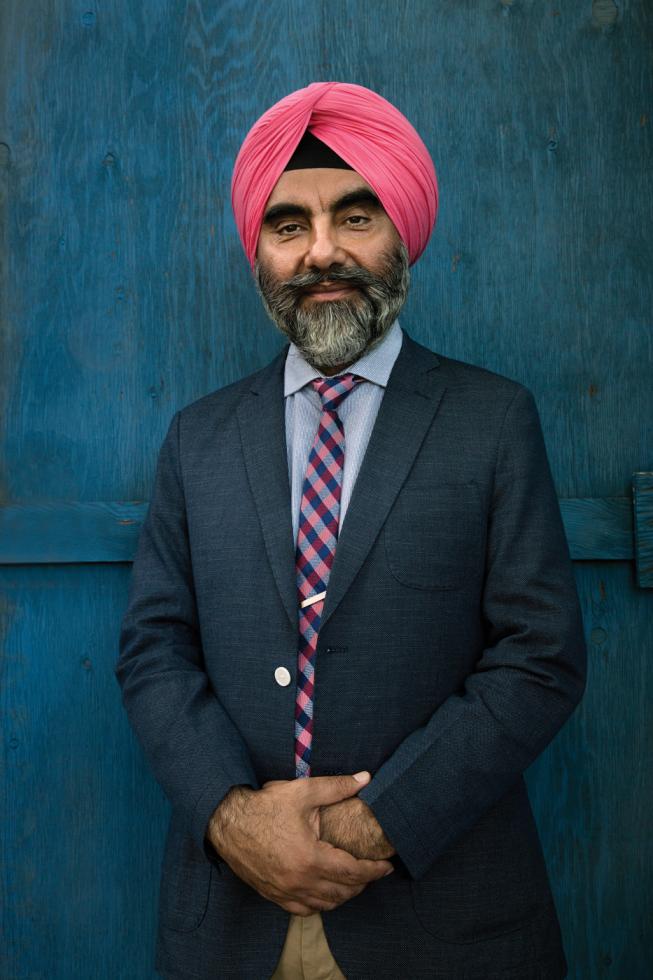
As for Bains, in 1962 he bought his first piece of farmland. He kept adding and adding through the years, and the 78-year-old now owns 40,000 acres in 13 counties and is the largest peach farmer in California — and perhaps the largest in the world.
“I’m very happy,” Bains says. “I think I did the best I possibly could for my family and I hope they appreciate it. I’ve truly been blessed.”
A Shared set of values
In 1499, Guru Nanak founded Sikhism in the Punjab region, which encompassed parts of modern-day India and Pakistan, and he traveled extensively to spread his message. “He was a very distinct preacher. The ideas he brought were very progressive,” says Dr. Jasbir Singh Kang, vice president of Rideout Medical Associates and medical director of Yuba Sutter Hospitalist Group. A Sikh — meaning student/disciple, or a seeker of knowledge — follows three golden rules: meditation, dignity through honest and hard work, and sharing one’s earnings with the needy. “Spirituality is achieved through selfless service,” Kang says.
“American core values, including those enshrined in the Constitution, are entirely consistent with Sikh values.” Dr. Nicole Ranganath, Middle East/South Asian Studies historian, UC Davis
Sikhism is the ninth-largest religion in the world with about 25 million followers, and between 200,000 to over 500,000 Sikhs live in the U.S. (Estimates vary as the Census does not record religious affiliation.) Those who migrated here did so for better jobs, to flee natural disasters or famine, escape violence or religious persecution, pursue education or to join family. In their adopted home, they have found a nation whose values resemble their own.
“American core values, including those enshrined in the Constitution, are entirely consistent with Sikh values — emphasis on equality is huge, merit of working hard and being able to succeed, and to achieve the American Dream,” says Dr. Nicole Ranganath, a historian in the Middle East/South Asian Studies Program at UC Davis and curator of the Pioneering Punjabis Digital Archive. “There’s a very strong tradition of fighting for social justice and human rights.”
Sikhs in California were this country’s first significant South Asian community, even though in India they have historically comprised only a small percentage of the population. The 1849 annexation of Punjab into British India resulted in a scarcity of land, propelling people to seek economic opportunities elsewhere, with the goal of acquiring wealth and returning home. Then, in the late 1800s, Sikhs — known as superior fighters — were recruited into the British Army and colonial police force, traveling overseas and eventually landing in California.
In early-1900s California, Punjabi laborers, students and professionals worked on lumber mills, the railroad and in agriculture, which made use of their traditional farming experience. Punjabis originated from the Indus Valley — in the cradle of civilization — on the fertile floodplain of the Indus River, and this ancient society was among the first to employ modern farming techniques. Immigrants settling in the Sacramento Valley were reminded of Punjab, which means “land of five rivers.”
But California’s Alien Land Laws of the early 1900s largely prevented Asian immigrants from owning agricultural land or possessing long-term leases (and were finally invalidated by the state Supreme Court in 1952). Additionally, immigration bans stalled the influx of non-European immigrants and kept Indian families separated for decades.
Immigration stopped first with the Immigration Act of 1917, which halted newcomers from Asia, and then with U.S. v. Bhagat Singh Thind in 1923, which made Indians (and other Asians) ineligible for citizenship as they were not considered “white” people. Not until the Luce-Celler Bill of 1946 were Indian nationals already in the country able to become naturalized American citizens, and the law set a quota of 100 Indian immigrants allowed into the U.S. annually. Punjabi-run businesses proliferated in Yuba City and the peach industry especially grew, Ranganath says.
That’s how Davinder Deol’s father came here in the early 1950s, when she was a child. Deol, who is now a vice principal in the Yuba City Unified School District, says virtually all the men in her village entered the lottery, and her father got lucky. But the policy deeply damaged families, she says, as it kept them separated. Over the next decade, her father sponsored his wife, daughter, parents and siblings to come over. In 1965, the Immigration and Nationality Act removed the quota rule, and more Punjabis rejoined their families.
The Punjabi American Festival is celebrated each May in Yuba
City.
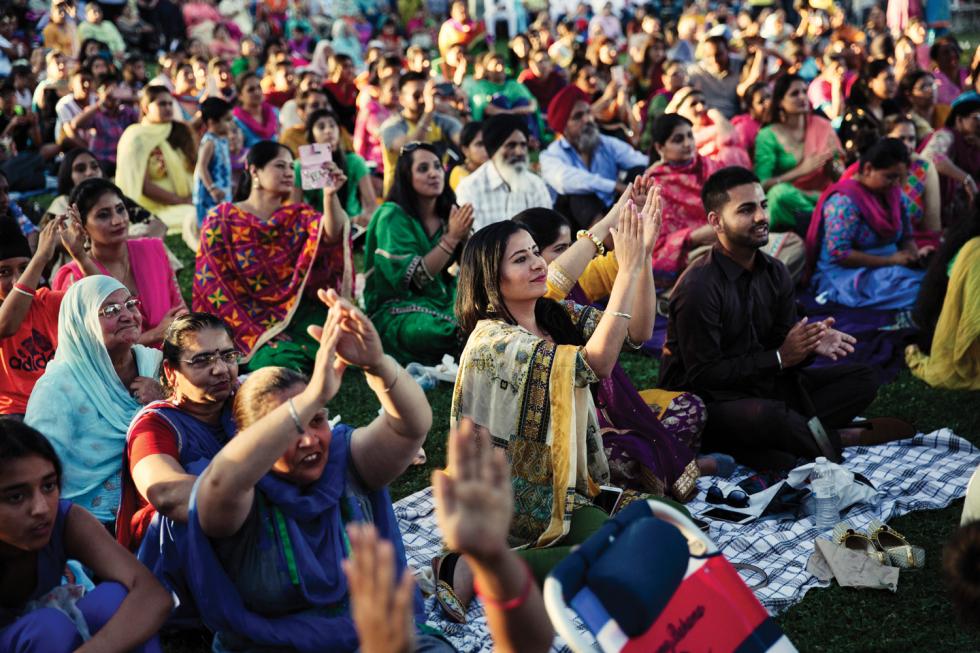
When Kulwant Singh Johl moved to Yuba City from India in 1970 at 20 years old, he ruminated long and hard over whether to remove his turban and cut his unshorn hair. A month passed before he took out a pair of scissors, believing that doing so would improve his job prospects and allow him to blend in with his new surroundings. “It was a very hard decision to me,” he says. He didn’t send a photo of himself back to his parents in India for five years, worried they would disapprove of their son with short hair and a shaved beard, going against the custom of baptized Sikh men.
After Johl arrived, he attended Yuba College and Chico State, earning a degree in agricultural science. He now works as an agricultural pest control adviser and took over the 1,000-acre family farm, which grows peaches, walnuts, almonds, prunes and pomegranates.
Related photo gallery: Land of Opportunity
Johl was not the first of his family to emigrate from Punjab. In 1906, his grandfather Nand arrived in the Yuba City area, leaving behind his wife and infant son. “When [my grandfather] came here, my father was 2 years old and they never met each other again,” Johl says. Nand was able to purchase farmland in 1946.
Meanwhile in 1947, the Partition of India marked independence from 300 years of British rule, but it was accompanied by a widespread bloodbath. Partition divided the subcontinent, separating the Hindu-majority India and Muslim-majority Pakistan. (Punjab was split into two provinces now in two different countries, with Muslims relocating to Pakistan, and Sikhs and Hindus fleeing to India.)
In the aftermath, sectarian violence erupted and Punjab became the epicenter. Up to 15 million people were displaced in what remains the largest human migration in history, and more than one million people were massacred — within only one year. “The Punjabi people paid the heaviest price for India’s freedom from British rule and the wounds from the partition have not yet healed today,” Ranganath says.
Each November, roughly 100,000 people attend the Sikh parade in
Yuba City. (Photo courtesy of Ranjit S. Kandola)
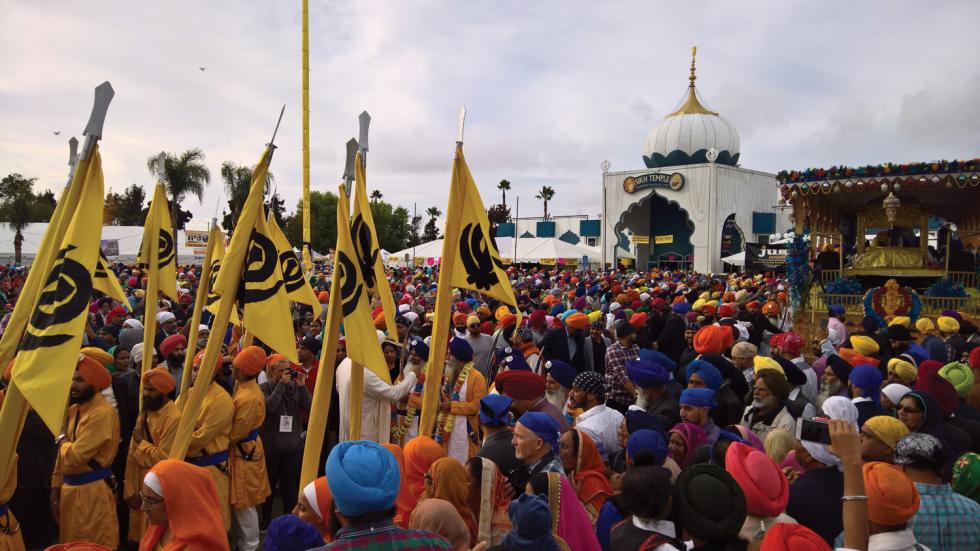
Then, in the 1980s, a Sikh leader named Jarnail Singh Bhindranwale advocated a separate homeland. Many Sikhs felt the Indian government was being too heavy-handed with its policies, instead of using peaceful, democratic means to address its grievances. In 1984, Bhindranwale and his armed followers holed up in the Golden Temple — the most sacred gurdwara, or place of worship for Sikhs — and Indian Prime Minister Indira Gandhi ordered a raid by the national army; hundreds of people were killed. In retaliation, Gandhi was assassinated by her two Sikh bodyguards. Mass violence against the Sikhs followed — a violence, Ranganath says, never addressed or acknowledged by the Indian government — that would lead to another wave of Sikh immigrants in the 1980s.
Embedded In Yuba City
Punjabis enjoy living in Yuba City for the same reasons as their neighbors: a family-friendly, small-town feel; affordable cost of living; good schools and abundant outdoor recreation, with the nearby Sutter Buttes and Feather River. “The Sikh community is very embedded here and is very much a central part of our community,” says Rikki Shaffer, CEO of the Yuba-Sutter Chamber of Commerce, which covers two counties and four cities.
While Shaffer can’t pinpoint exactly how many of the chamber’s 601 members are Sikh or Punjabi — the organization, of course, doesn’t track members’ religious or ethnic backgrounds — she says these residents play an important role in the region’s economy, including the three main industries of agriculture, medicine and military. (Beale Air Force Base is in Yuba County.)
“One of the things that sticks out to me is their open-door and welcoming policy to anybody,” Shaffer says. “Anybody can seek help from a Sikh temple.” For example, a gurdwara is a place where a person of any faith can get a free meal three times a day in the communal kitchen. The annual Nagar Kirtan Sikh parade in November is also a major boost to the area, with the 100,000 people it attracts. “Every hotel is booked,” Shaffer says. “They’re very welcoming to the entire community to come and be part of that celebration.”
Along its five-mile route, the parade passes the Sutter County Community Memorial Museum — which houses a permanent exhibit on local Punjabi history — to the city’s main gurdwara, built in 1969. On a recent afternoon, as Dr. Kang drives to the temple, he talks about his decision to leave India in 1986 at age 23. His father was a successful veterinarian and they had a comfortable life in a nice city, but the turmoil of the era threatened his freedom of speech and safety.
“I always read about JFK and Lincoln, and they were heroes to me,” he says. “I have no regrets coming here.” After completing a residency in internal medicine in Chicago, he moved to Yuba City in 1991 at the behest of a mentor who told him to go where he was needed. A couple years after arriving, Kang cofounded the Punjabi American Heritage Society and then the Punjabi American Festival, which occurs each May. He has become a leader in the community and vocal activist on the ways in which Punjabis contribute to the region. “I don’t think personal success is all that important,” he says. “It’s how it translates to your family and community that really matters in the long-term.”
Hitpal Singh Deol came to Yuba City in 1974 at 19 years old for an arranged marriage to Davinder. “I knew how to read and write, but I wasn’t fluent in speaking English, because I never had to,” he says. He did farm and factory work until saving enough cash to purchase his first Subway 25 years ago. He now owns a total of three in Oroville and Gridley.
“Literally, I think all Subways in California are owned by Punjabis,” Kang says, laughing, during a recent lunch of Thai food with his friends Deol and Johl. “Quite a few,” Deol acknowledges. Same goes with convenience stores, gas stations and other food chains. Trucking companies are the next frontier, they say. The men agree that a desire exists among Punjabis to work hard enough to become their own boss.
“The work ethic and the drive to succeed is the big factor in being able to do what I have done so far,” Deol says. “That’s true of most immigrants, it doesn’t matter which country you’re from. You’re giving up your own country, your own home, for that success. If you don’t have that drive, then it doesn’t make sense to move to that new country.”
Three generations of the Bains family at the Yuba City home of
Karm Bains.
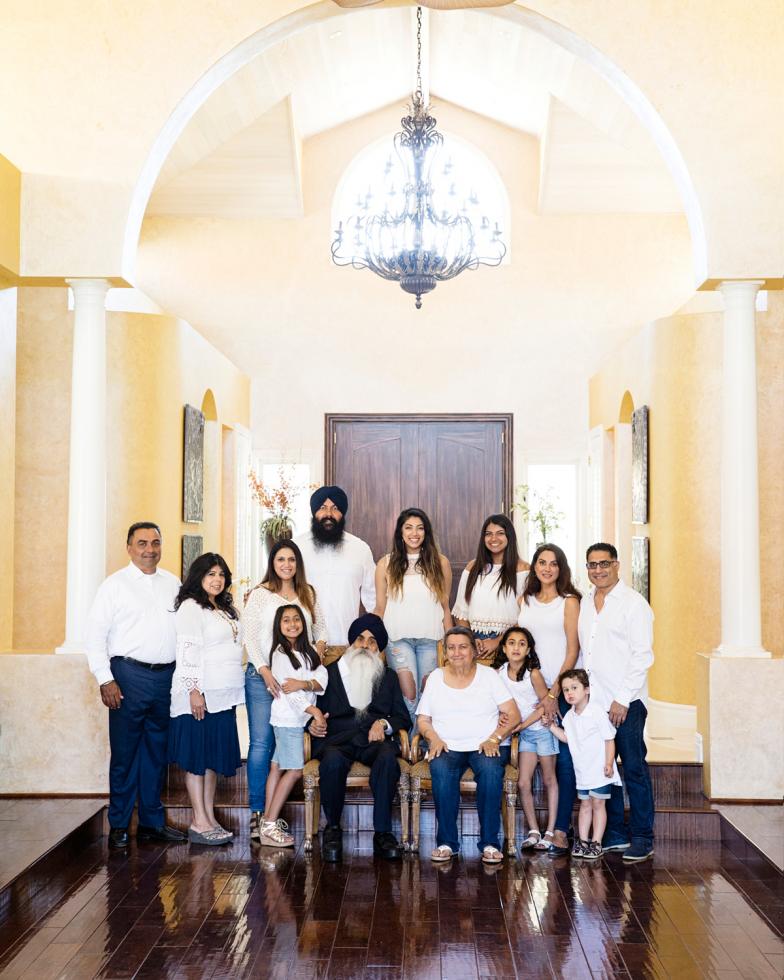
While cultural tensions remain, Deol says they have grown less frequent. One time a Subway customer emphasized that he only wanted white stuff on his sandwich, trying to stir up trouble. Deol asked if he wanted “wheat — the brown — bread” or “black olives.” He says the customer laughed and still comes in today. “I think it’s all on how you handle a situation,” Deol says.
Another time at the Santa Cruz Beach Boardwalk, someone told Deol’s family to go back to where they came from: “He’s just ignorant. He doesn’t know,” recounts Deol, who is Sikh, saying that he doesn’t take things personally. Sikhism, adds Kang, teaches its followers to be confident and strong, and ignore petty comments. “Otherwise,” he says, “we couldn’t be here if we worried about little things.” The mainstream community, he says, “has very much accepted us as part of them.”
That’s partly due to Yuba City’s Punjabi Americans becoming more civically involved. In 2009, local resident Kashmir Gill became the first Sikh elected as mayor anywhere in the U.S., and in 2014 Preet Didbal was likely the first Sikh woman in the nation elected to a city council, and now serves as vice mayor. State laws have also helped ease decades of discrimination and prejudice, including one that protects workers who wear turbans and other religious attire or hairstyles. But there remains room for progress, says Karm, son of Didar Bains. Punjabis are in the early stages of working with city and county officials and law enforcement to launch “Yuba City United,” an outreach campaign he says aims to remind residents of different ethnicities, nationalities and religions that “We’re all one.”
The Bains’ peach orchard in Yuba City.
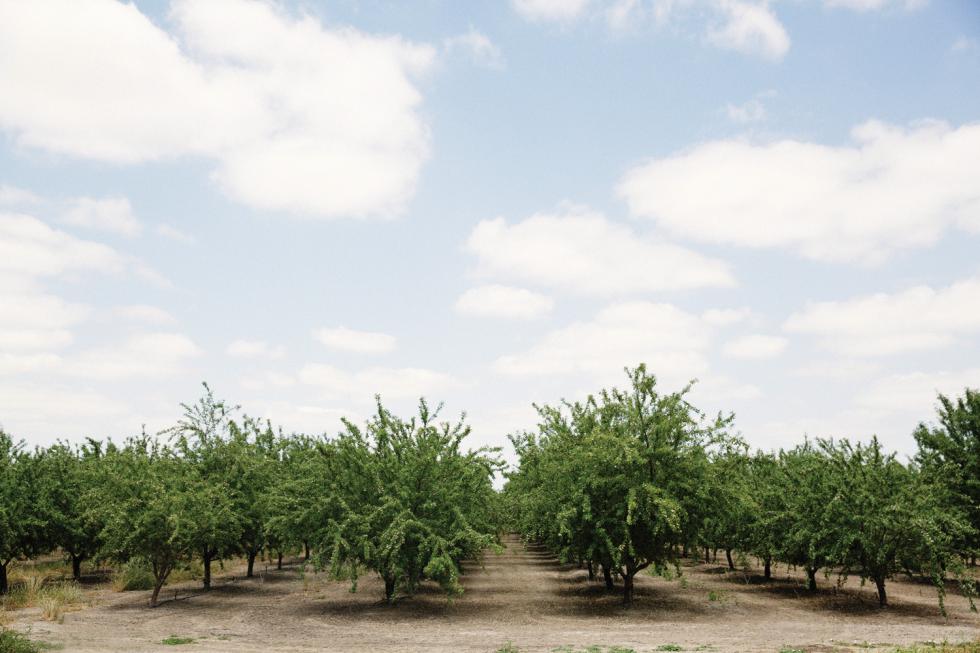
“It’s all one big community,” says Prem Hunji Turner, who grew up in Yuba City and now lives in Sacramento. Her mother was Hindu and her father was Sikh, and before Yuba City’s Hindu temple was built in 1996, the family would visit a gurdwara. Turner’s father came over in 1948, then worked as a peach and walnut farmer. At 99 years old, he donated $100,000 to local charities, before passing away earlier this year. Her late mother arrived in 1952 and in her 50s studied the English language at a community college. Shortly thereafter, she became the city’s first real estate agent of Punjabi descent, running Hunji Realty.
For the first generation of immigrants, the goal is to survive and for the second to achieve economic success for their families. For third generations and beyond, the focus is on living a full life. Kang wants his three children — who are studying medicine, filmmaking and finance — to explore the world, have new experiences and figure out what they want, which might mean leaving Yuba City. Simply having this option to pursue their own dreams available to his children means Kang has attained what he came here for: the American Dream. His friends feel the same.
“I haven’t found a Sikh saying anything bad about America,” Kang says. “They love this country better than anything else.”
Becoming the Peach King
Thirty-seven years ago, Didar Bains — whose first name means “visionary” in Punjabi — thought of starting an annual Nagar Kirtan Sikh parade in November to commemorate the receipt of their holy scripture, Guru Granth Sahib, in 1708 and to integrate his Sikh community into the larger Yuba City community. “First and foremost, there was that wish for acceptance,” says his son, Karm. “We look different, we have different religious beliefs. But in our religion, we believe in one God and we are all children of God.”
Didar Singh Bains “Peach King” of California
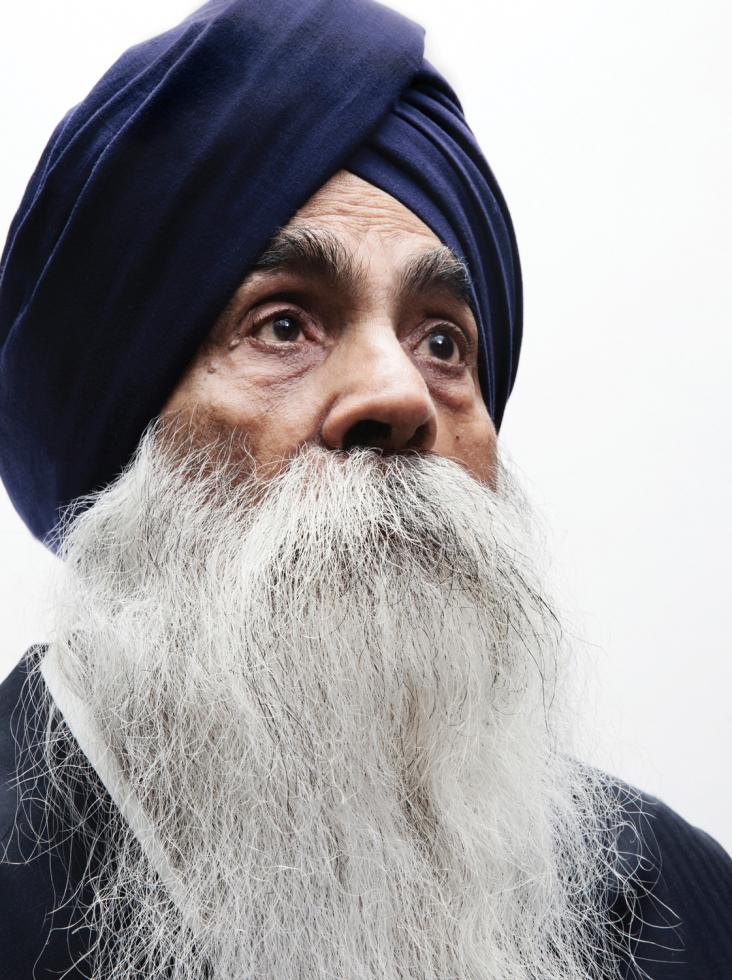
But his father’s peers pushed back, worried the celebration would fall victim to verbal altercations, disruptions or even violence. “My dad was like, ‘There’s one way to find out,’” Karm says. Bains, with both his farming operation and role in the parade, which grows every year, has brought international recognition to the Punjabi Americans of Northern California.
While Sikhs are supposed to refrain from being prideful, Karm says it’s hard to not be proud of his father’s accomplishments, which has had ripple effects for the entire extended family — who are involved in agriculture, growing peaches, prunes, walnuts and almonds, and maintaining a diversified land-development portfolio, including commercial, industrial and residential landholdings. Bains and his wife, Santi, raised three children, who are now grown with their own children.
“All of this with God’s grace,” Karm says. “We’re just here as stewards of the land to tend to [the fields] for the time being. We’re really fortunate and grateful for the opportunities this country has given us.”
During an inaugural visit to the Sikh temple in West Sacramento in 2014, Gov. Jerry Brown recognized Bains as the “Peach King” of California, and referenced the millions of dollars he has donated to nonprofits and schools in the U.S., Canada and back in his homeland of India. And, this past November, the Yuba City Council held a special meeting and reception to honor Bains as a community leader for his “incredible contributions” and for “enriching our cultural heritage.”
“That was hands-down,” Karm says, “the proudest moment of my life.”



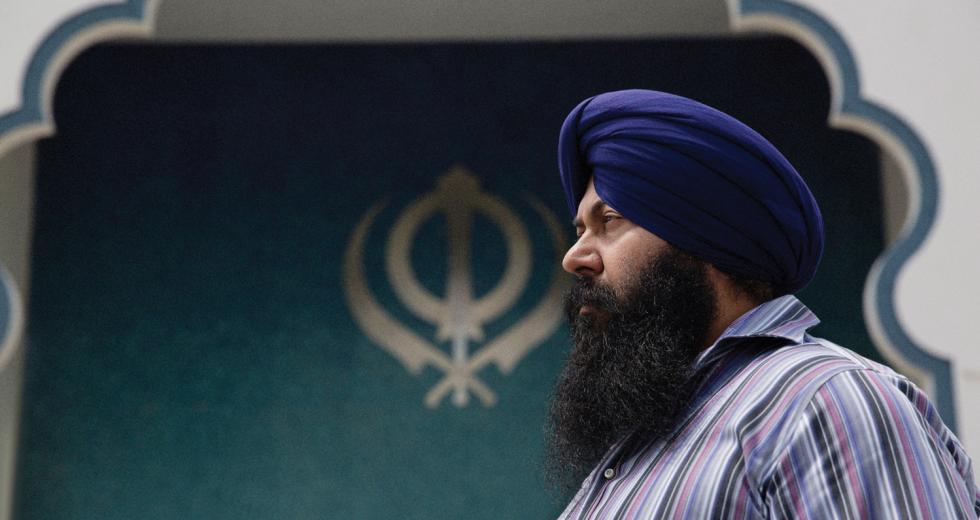
Comments
I'm in Lake County, but with no car. So I can only visit in spirit. Satnam.
I lived in, taught in, & raised my children in Tierra Buena for almost 30 years. I can not imagine my life without the amazing Sikh families as a vital part of the community. We were all lucky to have had each other.
It is very heartening to learn that Sikh Community doing so well in far off land California. This is all Guru Kirpa on we Sikhs.
It is very heartening to learn that Sikh Community doing so well in far off land California. This is all Guru Kirpa on we Sikhs.
It is very heartening to learn that Sikh Community doing so well in far off land California. This is all Guru Kirpa on we Sikhs.
Our Guru Nanak Dev Ji has blessed us with great success anywhere in the world.
Didar Singh Bains is my father and I am very proud of him and all he has done and to tell him I loved him all of my life and he was my heart and strength in this life.....Love you Dad..Ciba
Ciba are u really Didar’s daughter? I am his nephew and have never heard of u?
Very inspiring success story, worth emulating....
Good Work by Mr. Bains
Best regards to Bains Family
Raj Bagga